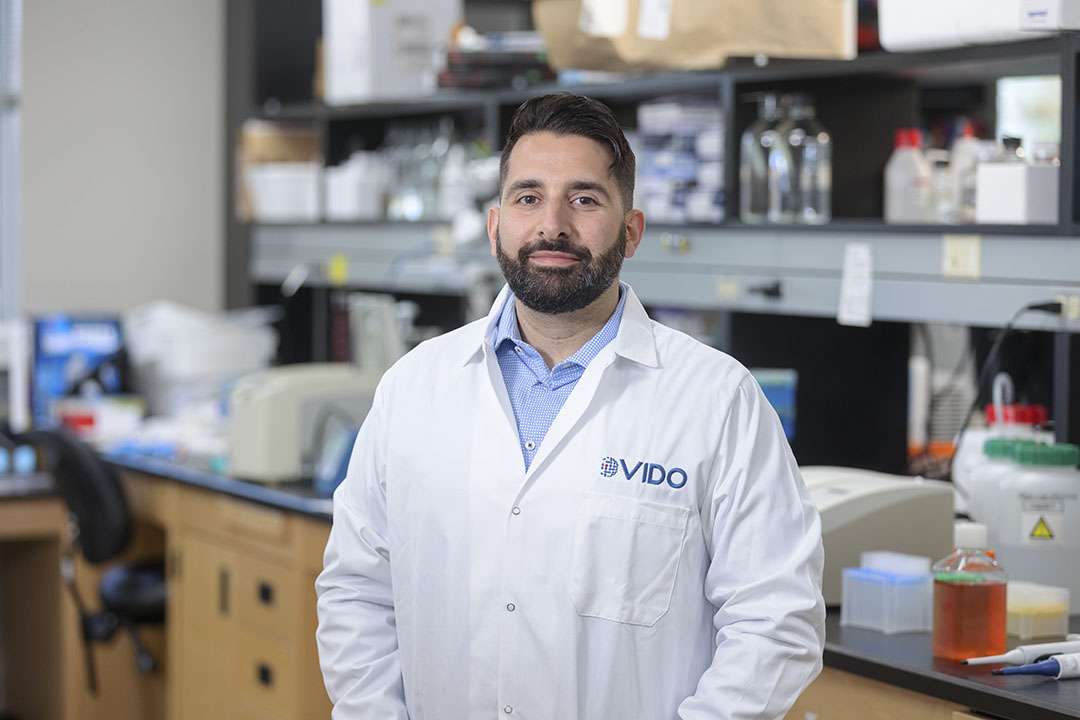
New USask funding to advance Canada’s beef sector
Dr. Antonio Facciuolo (PhD) from the Vaccine and Infectious Disease Organization (VIDO) at the University of Saskatchewan (USask) has new support to develop a vaccine against Johne’s disease — a chronic intestinal disease of cattle that's significant to the beef and dairy industry.
Facciuolo, who is also an adjunct professor at the Western College of Veterinary Medicine (WCVM), is one of five scientists at USask awarded funding from the Beef Cattle Research Council (BCRC) under the newly announced Canada’s Beef and Forage AgriScience Cluster.
The USask-led projects, totalling $3,107,317, will help bolster the beef sector’s environmental and economic sustainability. The research will focus on improving cow-calf health and productivity, breeding climate-resistant forages, studying the Canadian feed-lot industry, managing cattle diseases, and advancing gut health research.
“Agriculture is a signature area of research at USask and we are committed to advancing research that will create sustainable growth in this area,” said USask Vice-President Research Baljit Singh. “The funding announced by BCRC will allow us to drive innovation and make meaningful contributions that will bring great value to the beef industry.”
Johne’s disease, caused by the bacterium Mycobacterium paratuberculosis (MAP), is a contagious and lifelong infection that eventually progresses to severe inflammation of the small intestine in cattle. It's estimated the disease causes annual industry-wide losses ranging between $17 million and $28 million USD. Vaccines are not currently available in Canada.
Facciuolo, who has collaborators at the University of Calgary and Simon Fraser University, will receive $264,960 from BCRC to advance the development of a vaccine against MAP.
“I’m excited to build on our previous work which established an infection and vaccine screening model for Johne’s disease,” said Facciuolo, one of VIDO’s newest scientists.
“This funding will support the next steps in vaccine research and ultimately towards the development of a vaccine that can protect against this chronic and economically important disease.”
The team will test oral and injectable vaccine formulations using antigens identified in a previous project. Based on their findings they will select the combination that provides the best overall protection to help control this disease.
The BCRC also allocated $1,378,350 to the Canadian Cow-Calf Health and Productivity Enhancement Network (C3H/PEN). The project's principal investigator is Dr. Cheryl Waldner, a WCVM professor and the NSERC/Beef Cattle Research Council Industrial Research Chair in One Health and Production-limiting Diseases.
Collaborators include Dr. John Campbell of the WCVM, Kathy Larson of the USask College of Agriculture and Bioresources, Dr. Marjolaine Rousseau of the University of Montreal, and Dr. Claire Windeyer of the University of Calgary.
Other USask projects that received support under Canada’s Beef and Forage AgriScience Cluster include the following:
- Bill Biligetu (PhD), USask College of Agriculture and Bioresources — $201,680. Breeding climate-resilient forage germplasm for the Canadian beef industry: a national collaboration.
- Greg Penner (PhD), USask College of Agriculture and Bioresources — $961,859. Re-considering treatment strategies: can we accelerate recovery from disease by considering gut health?
- Gabriel Ribeiro (PhD), USask College of Agriculture and Bioresources — $300,468. A benchmark study of the Canadian feedlot industry and an evaluation of best management practices to improve the sustainability of feedlots.
